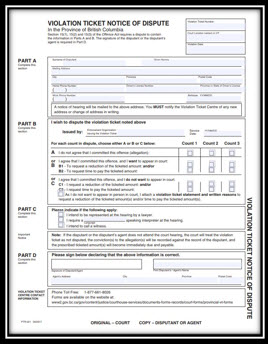Available as a podcast!
So, you’ve been given a traffic ticket and you want to dispute it. This eNews not only explains how to dispute a ticket, arrange a hearing, and prepare for the hearing, but it answers FAQs about the process and some of the complications people encounter.
The information in this article is taken from the court’s new Guide to Disputing a Ticket.
Filing a Notice of Dispute
Check the ticket for instructions on how to dispute it. If you want to dispute a traffic ticket you must file a Notice of Dispute within thirty days of getting your ticket. Be sure to provide your complete mailing address. For example, don’t forget your box number, apartment number and postal code. You’ll receive a Notice of Hearing in the mail, although this may take several months.

The Notice of Hearing tells you the date that you are to come to court for your hearing. This is the day you come to court prepared to hear the police officer present their case and prepared to present your case to the court.
On the Notice of Dispute you have the opportunity to request an interpreter at no cost to you. The interpreter may appear in person or by telephone. If English is your second language, consider that you might be nervous on the hearing date, that there may be legal terms used that are new to you in English, and that having an interpreter might help you.
What if I only want to dispute my fine?
If you agree that you committed the offence, but just want to dispute the amount of the fine shown on your ticket, you can do that on the Notice of Dispute.
You can dispute the fine amount in person at court or by filling out a second form called Violation Ticket Statement and Written Reasons. Complete that form, give reasons to have the fine reduced, and ask for time to pay your fine. A judicial justice will review your reasons and make a decision. You will not have to come to court if you fill out and send in this form.
In the form, explain thoroughly why you are asking for a reduced fine and time to pay. Be aware that:
What if I move before I get my Notice of Hearing?
If you change your address after you filed the Notice of Dispute and before you get the Notice of Hearing, complete a Violation Ticket Change of Address form and send it to the Violation Ticket Center at the address on the form. Changing your address with ICBC and the Motor Vehicle Branch is not enough. If you change your address after getting the Notice of Hearing, send the form to the Violation Ticket Centre and to the Court.
What if I can’t come to court on the date of the hearing? When you get your Notice of Hearing, check the date right away. If it is on a date that you are already scheduled to be somewhere else and you cannot easily change the other matter, you have the right to ask for a different hearing date.
Complete and send in an Application to Adjourn a Hearing as soon as you can. Explain in detail on the form why you can’t come to court on the scheduled date.
How can I get ready for the hearing?
If you haven’t already done so, write notes about what happened. The best time to do that is right after the traffic stop. If you didn’t do that, put down what you remember and write some notes to help you remember the points you want to make in court. You may be questioned (cross- examined) about your notes if you refer to them while testifying.
If possible, make three copies of any photos, maps or other documents that you wish to have the court consider at your trial. If you can’t get three copies, bring one.
Find out exactly what you’re charged with. The ticket will show an offence. Look up the offence online and read the statute section – it tells you what the evidence must prove in order for you to be found guilty at your hearing.
Find BC laws at:
It also helps to find out what the police officer who dealt with you will say in court. You are entitled to know this.
How can I find out what information the police officer will bring to court?
You can send a letter to the officer (their name, number and office address should be on the ticket) asking for a copy of all the information they have about the traffic stop and witnesses they intend to call to testify. Do this right after you send in your Notice of Dispute.
Some of the information that you are entitled to receive includes:
• A copy of the officer’s notes and a typed version if you can’t read the notes or they use abbreviations you don’t understand
• Witness statements or a summary of the witness’ statement to police
• A summary of what the officer states you said
• A copy of any video or audio evidence relating to the traffic stop
Date and keep a copy of the letter you send and if there is no response send another letter. If you don’t get the information from the officer, bring those letters with you to court and tell the judicial justice who conducts your hearing at the beginning of the hearing.
Can someone else go to court for me?
You must come to court yourself for the hearing if you want the justice to consider your side of the story. You cannot usually send in a written statement, nor can you send someone else to tell your side of things by testifying on your behalf (unless that person was a witness present when the incident that led to the ticket happened).
You can send another person to court to ask for a different hearing date if you have suddenly become unavailable and did not have time to send in the Application to Adjourn.
Also, another person may be able to come to court for you to ask questions of the police officer and make legal argument to the court in the hearing, but that person cannot tell your side of the story if you are not at court and they were not present at the incident.
Can I bring witnesses to court?
If you want to have the justice conducting your hearing consider evidence from witnesses other than yourself, they must come to court. The justice will not usually consider letters or written statements in a hearing.
You can get a subpoena (a court order that requires a person to attend court) from the Court Registry to compel your witnesses to come to court or to show their employers.
What if I want a lawyer to conduct my hearing?
If you want a lawyer to represent you, you should hire a lawyer by the time that you send in your Notice of Dispute. The lawyer’s schedule will have to be considered when your hearing date is set, and many lawyers are not available for a hearing on short notice. See Finding a Lawyer for helpful links.
If you intend to ask the Court to consider the Charter of Rights and Freedoms during your hearing, it will be set for hearing by a Provincial Court judge. You, or your lawyer if you have one, should tell the Violation Ticket Center or the Court as soon as you know that you wish to raise a Charter issue, so your hearing can be scheduled without added delay. (You may also wish to read the Constitutional Question Act.)
More information
Much of this website’s information on preparing for a criminal trial will apply to traffic and other tickets and by-law hearings as well.
Watch the Provincial Court website for next week's eNews on what to expect at a ticket or by-law hearing, and see the Court's Guide to Disputing a Ticket.
This article provides general information only and should not be used as authority in court proceedings or as a substitute for legal advice.

